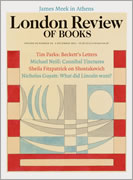Universities under Attack
We are all deeply anxious about the future of British universities. Our list of concerns is a long one. It includes the discontinuance of free university education; the withdrawal of direct public funding for the teaching of the humanities and the social sciences; the subjection of universities to an intrusive regime of government regulation and inquisitorial audit; the crude attempt to measure and increase scholarly ‘output’… More
FROM THE LATEST ISSUE
In Athens
Darkness has fallen, and with it, a dynasty. George Papandreou, the prime minister, is on the car radio, making his parting speech. Since 1944 he, his father Andreas and his grandfather Georgios have been prime minister six times between them. Papandreou 3.0’s premiership was blighted from the start. On 20 October 2009, only 16 days after his mild-soup PASOK socialists had come to power, his finance minister piped up at a meeting with European counterparts in Luxembourg. Reminding them of Greece’s already high budget deficit, he confessed that, actually, it looked like being about twice as high. Sorry! It’s been downhill ever since, as the assortment of Greek and foreign lenders who allowed the country effectively to run up a huge mortgage jacked up the interest rate on that mortgage to fantastic levels. More
Beckett’s Letters
At the turning point of this second volume of Beckett’s letters, which is also the turning point of his professional life, the moment when, after so many years of ‘retyping … for rejection’, his best work is finally to be published with enthusiasm by editors determined to let the world know what they have discovered, the author’s partner, Suzanne Déchevaux-Dumesnil, writes to Jérôme Lindon at Editions de Minuit to advise that Beckett does not wish his novel to be entered for the Prix des Critiques. It is 19 April 1951, Beckett is 45, the novel in question is Molloy. Suzanne explains: ‘What he dreads above all, in the very unlikely event of his receiving a prize, is the publicity which would then be directed, not only at his name and his work, but at the man himself.’ More
The Obdurate Knoll
The cultural consequences of 22 November 1963 are far more interesting than the events of the day itself. Historians like me tend not to find much of interest in the killing of one person by another, especially when the killer seems to have been a dysfunctional misfit. Of course, the assassination had puzzling aspects: Lee Harvey Oswald’s lengthy stay in the Soviet Union during some of the hottest years of the Cold War; the unlikely trajectory of one of the three bullets fired from the Texas School Book Depository, the ‘magic bullet’ which passed through the president’s neck and then through the body of the Texas governor, John Connally; and Oswald’s own murder while in police custody at the hands of Jack Ruby, a Dallas nightclub owner. More




